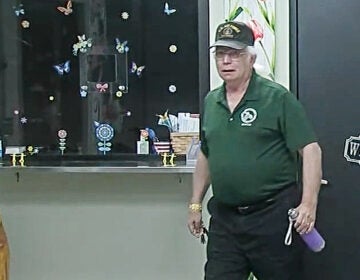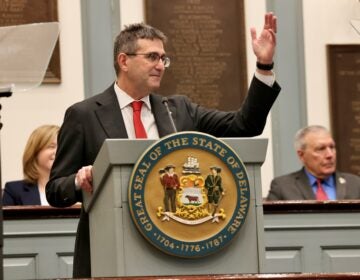Small planet, big-time visitor — connecting Pluto and the pontiff
Listen
In this photo taken on Sunday, July 12, 2015, Pope Francis waves as he boards the plane back to Rome, in Asuncion, Paraguay. Pope Francis departed after a week long trip to Ecuador, Bolivia and Paraguay. (L'Osservatore Romano/Pool Photo via AP)
Pope Francis will soon be flying to Philadelphia. And just last week, the questioning spirit of science did a flyby of Pluto.
Our assignment today, class, is to explore what one event might have to do with the other. Here’s my take:
September’s papal visit to America, which will wrap up in Philadelphia, seems to stir markedly different reactions.
Many folks, whether faithful Catholics or just observers impressed by the fresh pastoral breeze Francis has brought to the global church, are thrilled that this admired world figure is coming to our city.
Still, some Philadelphians being, well, Philadelphians, grab the cranky side of the stick — complaining about traffic, fences and crowds.
Others seem to have a problem with the Catholic Church that Francis’ sunny spirit and fervor for justice can’t erase; anger over matters such as clergy abuse, abortion and gay rights runs understandably deep.
Then there’s a substantial cohort — and if you’ve never heard from them, just check the comments section below in a couple hours — who just seem to have a quarrel with religion, period.
These are the atheists of the militant rationalist stripe. They are not just agnostics – doubting the divine, but not looking for a scrap. No, these militants regard belief in God as obnoxious and damaging, an offense against reason that they are obligated to criticize.
The militants seem to think all religion rests upon naïve fundamentalism, antagonism to the scientific method and willful ignorance. They can cite only the evil done in the name of faith, never the good. They are like a sports page that reports on the game only when the home team loses.
They seem never to have met the many Christians who not only revere science, but practice it at a high level, who relish discoveries about the origins of the universe, the habits of subatomic particles, the workings of the brain.
Faith and science need not be foes. They are different pursuits, with different goals and ways of knowing.
The militants seem to like to claim science has resolved all the great questions, routing God from the field.
Then, something happens like those amazing photos arriving from Pluto. And we see scientists almost weep with joy to discover how wrong their predictions could be and how many riddles yet remain to be unraveled.
A sense of mystery is the beating heart of both faith and science. Just as faith does, great science spurs humility before the awe-inspiring complexity of the universe.
Some scientists glimpse the divine behind the wonder; some most emphatically do not. Either way is fine with me, as long as no one uses science as a simplistic (dare I say, fundamentalist) club with which to beat religious faith over the head.
Only fools feel a need to pick a side and pick a fight.
ADDENDUM: Some might call it coincidence; I prefer to call it subtle guidance from the Holy Spirit.
When I picked up something to read while eating lunch today, my hand happened upon a collection of the works of Reinhold Neibuhr, the great American theologican and social thinker. I’ve been dipping into this rich, blue-bound volume from time to time. Not five minutes into today’s session, I was reading this passage from the Notebook of Tamed Cynic:
“One half of the world seems to believe that every poetic symbol with which religion must deal is an exact definition of a concrete or an historical fact; the other half, having learned that this is not the case, can come to no other conclusion but that all religion is based upon fantasy.
“Fundamentalists have at least one characteristic in common with most scientists. Neither can understand that the religious imagination has a way of arriving at truth by giving a clue to the total meaning of things without being in any sense an analytic description of facts. The fundamentalists insist that religion is science, and thus they prompt those who know that is not true to declare that all religious truth is contrary to scientific fact.
“How can an age which is so devoid of poetic imagination as ours be truly religious?”
Why should I have expected anything else? Neibuhr said what I was trying to say here better, and about 90 years earlier.
WHYY is your source for fact-based, in-depth journalism and information. As a nonprofit organization, we rely on financial support from readers like you. Please give today.




